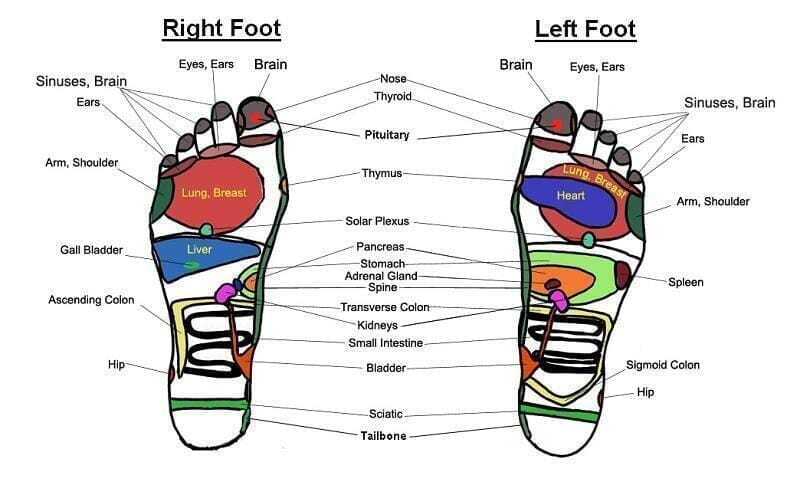5 Ways to Tell If Your Gut Health Isn’t Where It Should Be | Herbal Goodness
Your gut is called your second brain for a reason.
it is super smart. Maybe even genius.
John-Hopkins Medicine says that the gut and brain are part of the enteric nervous system (ENT). The ENT contains over 100 thousand nerves in layers from the throat to the anus.
Within those layers of nerves are neurons that communicate to your brain about what is happening down below.
Even though the neurons can’t “think,” as the neurons in our brains allow us to do, they are constantly communicating with the brain about what we’ve eaten, when we’re stressed, when we’re sick, and more. [1]
Good gut health is signified by five easy-to-observe indicators (and the lack of good gut health thereof):
1. You Crave Sugary Foods and Carbs

Bacteria in the gut tell you what to eat, not the other way around! When the bad bacteria outnumber the good bacteria in your gut you are much more likely to crave unhealthy foods like sugary desserts or simple carbohydrates. This is because unhealthy bacteria live off sugar. [2]
A healthy gut will crave foods that support healthy bacteria such as leafy greens, fiber, plant-based proteins, etc.
Papaya leaf extract, enzymes, and probiotics can help to balance the microbiota in favor of healthy bacteria to help reduce sugar cravings.
2. You Have Digestive Issues
Unhealthy bacteria in your gut can wreak havoc on your digestion. As bad bacteria digest the foods you eat, they create gas, and other metabolic toxins that can cause gas, bloating, and even leaky gut syndrome. [3]
A healthy gut won’t cause flatulence, gas, or bloating.
3. You Don’t Sleep Well
Believe it or not, your gut health has an effect on your sleeping patterns, and your sleeping patterns change based on your gut health. These two seemingly unrelated things are deeply interdependent.
As few as two nights of missed sleep can negatively affect the gut’s microbiome.[4] This can cause you to eat differently, alter your immune system and more.
Make your room as dark as possible at night, and turn off all your electronic devices (smartphones, TVs, laptops, etc.) at least an hour before bed to help create an environment that promotes healthy sleep.
4. You Don’t Think Clearly
Your gut health affects your cognitive performance. Our gut is an extremely complex system, and when it isn’t healthy, you may notice that you experience brain fog, loss of memory recall, and difficulty concentrating. [5]
Whereas good gut health promotes great brain function. Your diet, and thus your brain ’s performance is directly connected to your gut health – either creating or minimizing brain plasticity. [6]
5. Your Mood Just Isn’t What it Used to Be
Your gut determines your happiness to a large extent.
Scientists are just now discovering a link between gut health and anxiety and depression.
As Harvard Health explains it,
“Given how closely the gut and brain interact, it becomes easier to understand why you might feel nauseated before giving a presentation or feel intestinal pain during times of stress. That doesn't mean, however, that functional gastrointestinal conditions are imagined or "all in your head." Psychology combines with physical factors to cause pain and other bowel symptoms. Psychosocial factors influence the actual physiology of the gut, as well as symptoms. In other words, stress (or depression or other psychological factors) can affect movement and contractions of the GI tract, make inflammation worse, or perhaps make you more susceptible to infection.” [7]
However, it is even more complex than this. Your gut’s microbiota is constantly sending signals to your enteric system which then communicates with your entire endocrine system, which then regulates hormones such as serotonin and oxytocin, which contribute to an elevated or calm mood.
Even the state of our gut flora in early life can affect our “happiness” throughout the rest of life. [8]
[1] The Brain-Gut Connection. (n.d.). Retrieved from https://www.hopkinsmedicine.org/health/healthy_aging/healthy_body/the-brain-gut-connection
[2] Sheikh, K. (2017, April 25). How Gut Bacteria Tell Their Hosts What to Eat. Retrieved from https://www.scientificamerican.com/article/how-gut-bacteria-tell-their-hosts-what-to-eat/
[3] SIBO Treatment, Symptoms, Diet & Causes. (2017, September 11). Retrieved from https://www.emedicinehealth.com/small_intestinal_bacterial_overgrowth/article_em.htm
Related: Support healthy weight with a balanced diet & an active lifestyle
[4] Benedict, C., Vogel, H., Jonas, W., Woting, A., Blaut, M., Schürmann, A., & Cedernaes, J. (2016). Gut microbiota and glucometabolic alterations in response to recurrent partial sleep deprivation in normal-weight young individuals. Molecular Metabolism, 5(12), 1175-1186. doi:10.1016/j.molmet.2016.10.003
[5] Interplay Between the Gut-Brain Axis, Obesity and Cognitive Function. (n.d.). Retrieved from https://www.frontiersin.org/articles/10.3389/fnins.2018.00155/full
[6] DeFeudis, F. V. (n.d.). 2 Effects of Nutrients on Brain Function. Nutrients and Brain Function, 11-19. doi:10.1159/000414578
[7] Harvard Health Publishing. (2018, July 13). The gut-brain connection - Harvard Health. Retrieved from https://www.health.harvard.edu/diseases-and-conditions/the-gut-brain-connection
[8] Early gut bacteria regulate happiness. (2018, August 20). Retrieved from https://www.sciencedaily.com/releases/2012/06/120612115812.htm










